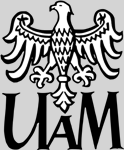History of the Department
From Department of Applied Logic
Contents |
The Department of Applied Logic has been established at the Institute of Linguistics of the Adam Mickiewicz University in Poznań in 1995. Departments or chairs of logic in Poland are situated, as a rule, at either mathematical or philosophical faculties. Thus our Department is, in a sense, a little bit different one, at least as academic topography is concerned.
The Department's members at the present moment
- Prof. Dr. Jerzy Pogonowski (head)
- Dr. hab. Władysław Zabrocki
- Dr. Victoria Kamasa
- Dr. Włodzimierz Lapis
- Dr. Dorota Lipowska
- Dr. Sławomir Sikora
- Ida Stria, M.A.
- Paulina Wandas, M.A.
Where do we come from
- Jerzy Pogonowski has studied mathematics (1969-1972 Adam Mickiewicz University, 1972-1974 Warsaw University). Since 1995 he has been allowed by the Rector of the Adam Mickiewicz University to lead the Department of Applied Logic.
- Władysław Zabrocki has studied philosophy (1974-1978, Adam Mickiewicz University). He was hired at the Institute of Linguistics of the Adam Mickiewicz University in 1979 and defended his PhD there in 1987.
- Włodzimierz Lapis has studied mathematics (1985-1990, Adam Mickiewicz University). He was hired at the Institute of Linguistics of the Adam Mickiewicz University in 1990 and defended his PhD there in 1999.
- Dorota Lipowska has studied mathematics (1976-1981), Adam Mickiewicz University). She was hired at the Institute of Linguistics of the Adam Mickiewicz University in 1982 and defended her PhD there in 1988.
- Sławomir Sikora has studied philosophy (1984-1989, Adam Mickiewicz University). He was hired at the Institute of Linguistics of the Adam Mickiewicz University in 1991 and defended his PhD there in 2000.
- Victoria Kamasa has studied linguistic and information science (2001-2006) and sociology (2002-2007), both at the Adami Mickiewicz University in Poznan. At present, she is a PhD student at our Department.
Cooperation with others
- Jerzy Pogonowski participated in the research project Logical structure of non-formalized inferences conducted in 1986-1990 by the Institute of Philosophy and Sociology of the Polish Academy of Sciences. He visited twice the Department of Linguistics of the State University of New York at Buffalo (1978-1979, visiting research scholar, 1990 International Research Exchange Board). As an Alexander von Humboldt Stiftung's fellow he visited the Institut für Deutsche Philologie der Universität München (1983-1984) and Fachbereich Philosophie der Universität Konstanz (2003). He was also employed additionally at the Mathematical Institute of the Polish Academy of Sciences (1977-1978) and at the Chair of Applied Mathematics of the Academy of Economics in Poznań (1993-1994). Recently he collaborates with: Department of Mathematical Logic at the Faculty of Mathematics and Information Science of the Adam Mickiewicz University (editorship, with Prof. Roman Murawski of Euphony and Logos), Chair of the Foundations of Mathematics of the Institute of Mathematics and Information Science at the University of Opole (participation in Prof. Janusz Czelakowski's seminar as well as in his research grant KBN 2H01A 00725 Infinitary methods in the theory of definitions), Department of Logic of the Institute of Philosophy at the Warsaw University (participation in the research grant KBN 1H01A 01116 Non-Fregean logic. Theory and applications headed by Prof. Mieczyslaw Omyła) and Chair of Logic and Methodology of Sciences at the Wrocław University (work on Skolem's Paradox and Ernst Zermelo's ideas concerning infinitary logic, under kind intellectual influence of Prof. Jan Zygmunt). More recently Jerzy Pogonowski cooperates with the Department of Logic and Cognitive Science of the Adam Mickiewicz University (common works with prof. Andrzej Wiśniewski, concerning applications of recursion theory in erotetic systems). In the academic year 2009-2010 Pogonowski lectured on Metalogic (Institute of Philosophy, Opole University). He participated in the research project Continuity and the real numbers. Eudoxos-Dedekind-Conway (headed by prof. Piotr Błaszczyk) in the Institute of Mathematics, Pedagogical University in Cracow.
- Dr. Włodzimierz Lapis cooperates with Prof. André Włodarczyk in an international project CASK devoted to theoretical and practical aspects of translation.
- Dr. Dorota Lipowska cooperates with Prof. Grażyna Demenko in an international project devoted to speech analysis and synthesis. Additionally, she cooperates with Prof. Adam Lipowski on computer modelling of several interdisciplinary problems (e.g. variants of a traveling salesman problem, population dynamics in lattice prey-predator models).
Logical research in Poznań
Information concerning the history of logical research conducted in Poznań (up to 1972) can be found e.g. in the paper by Seweryna Łuszczewska-Romahnowa Logika (Logic) included in: G. Labuda (ed.) Nauka w Wielkopolsce. Wydawnictwo Poznańskie, Poznań 1973, 190-198.
It is worth pointing out that several famous Polish logicians have been affiliated for some time to the University in Poznań, e.g. Zygmunt Zawirski, Kazimierz Ajdukiewicz, Roman Suszko, Seweryna Łuszczewska-Romahnowa, Adam Wiegner, Zygmunt Ziembiński, to recall just few of them.
Clearly, the person who mostly influenced the logically based investigations conducted at the Institute of Linguistics is Prof. Tadeusz Batóg who is now working at the Department of Mathematical Logic of our University. And the development of those investigations would be impossible without vivid and creative stimulation from Prof. Jerzy Bańczerowski, the Director of the Institute of Linguistics, who devoted dozens of his works to axiomatic descriptions of natural language.
Other Departments of Logic in Poznan
Our Department is not, by any means, the most influential logical center in Poznań. Recently, logical research in Poznań is conducted at several places:
- Department of Mathematical Logic Faculty of Mathematics and Information Science;
- Department of Computation Theory Faculty of Mathematics and Information Science;
- Division of Computational Linguistics and Artificial Intelligence Faculty of Mathematics and Information Science;
- Department of Logic and Methodology of Sciences Institute of Philosophy;
- Department of Logic and Cognitive Science Institute of Psychology;
- Institute of Information Science Poznan University of Technology.



